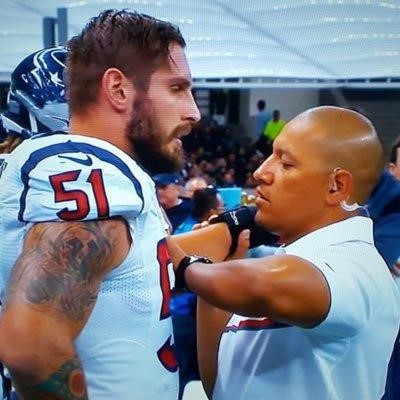Sports PT Spotlight
Roland Ramirez, ATC, LAT, PT, SCS, CSCS
Director of Rehabilitation/Associate Head Athletic Trainer
Houston Texans
Roland Ramirez enters his eleventh season with the Houston Texans and currently serves as the Director of Rehabilitation/Associate Head Athletic Trainer. He served as the Coordinator of Rehabilitation with the Atlanta Falcons during the 2007 season, and served as a contract athletic trainer for the Tennessee Titans during the 2005 and 2006 seasons. Ramirez also served as an assistant athletic trainer for the Nashville Kats Arena Football team (AFL) during the 2006 season.
Prior to entering the ranks of the NFL, Ramirez worked as a physical therapist in an orthopedic and sports medicine clinic while completing his graduate work in athletic training. He earned a dual masters degree in Physical Therapy and Athletic Training from the Texas Tech University Health Sciences Center in 2004 and 2005, respectively. Ramirez completed his undergraduate work at Texas Tech University, where he also played football from 1998-99.
Ramirez was the recipient of the 2016 AFC Tim Davey Assistant Athletic Trainer of the Year Award, which is awarded by the Professional Football Athletic Trainers Society (PFATS). He was also recognized as the 2015 Distinguished Alumni of the Year awarded by the Texas Tech University Health Sciences Center. The Houston Texans athletic training staff were also the recipients of the 2013 Athletic Training Staff of the Year awarded by PFATS.
Ramirez is board certified as a clinical specialist in sports physical therapy by the American Board of Physical Therapy Specialists. In addition, he is certified as a Strength and Conditioning Specialist and holds several other certifications in the sports medicine arena, including Functional Dry Needling. Ramirez is an active member of the NATA, APTA, NSCA, and currently serves as the AFC Representative on the executive board for PFATS.
Why did you decide to pursue a career in Sports PT? How did you get to where you are today?
I have always been a lifelong sports fan. Coming out of high school I had a goal to become a rehab coordinator for a professional football or baseball team. After completing my undergrad at Texas Tech University, I pursued a dualMasters degree in ATC and PT from the Texas Tech Health Sciences Center. Through this program, I found my way to completing a clinical rotation with Vanderbilt Sports Medicine. Through this affiliation, I made connections with the Tennessee Titans and was offered a job with the team following graduation. From Tennessee, I moved on to become the Rehab Coordinator of the Atlanta Falcons and then was offered the same position with the Houston Texans where I have been for the last 10 seasons.
What type of athletes or teams do you work with now?
The Houston Texans are a professional football team in which I manage the rehab for all of our players. Our sports medicine staff consists of five full-time ATCs and three year-long interns that are also ATCs. Three of the full time employees are PT/ATCs.
What forms of manual therapy do you implement into your practice and what benefits have you seen from these techniques?
I use a wide variety of Manual Therapy everyday with the team. From spine mobilizations, hip mobilizations with a belt, or Mulligan Ankle mobilizations, we are always striving to find the best techniques that will help our players be more functional. In a nutshell, we use soft tissue techniques to mobilize the tissue, followed by joint mobilizations to improve or sustain ROM and then therapeutic exercise to complete the rehab process. Our players feel better and are more prepared for their daily exercise program after following this protocol.
What do you feel makes treating the sports population different from the orthopedic population?
Athletes in the professional football ranks have a unique ability to overcome challenges. Their athleticism is unmatched and they are very good compensators. Mentally, these athletes are just wired differently than the typical ortho population and they expect greatness every time they step on the field. As a therapist, I have to stay creative in order to keep challenging the athletes and attempt to simulate position-specific drills for each player to help prepare them to return to sport. Working in this setting allows us to be more progressive and aggressive with our rehab programs and field work to meet the demands of the sport.
What's the best professional advice you would give a clinician in order to be successful in the field of Sports PT?
The world of professional sports rehab is a hard setting to crack into. You have to set yourself apart through continuing education and specialization. Make your resume stand out. Networking and making connections is also imperative. Get your foot in the door and make a good first impression.
“The day you get complacent is the day that you’re done” is a piece of advice that I often pass on to others. In this field, you have to continue to learn and push yourself forward because there is often another guy ready to take your position. Working with a professional team is a full time commitment that many people do not understand. You have to be prepared to work 7 days a week with no days off and no holidays during the season. It takes tremendous discipline and grit to be in this profession but if you are up for the challenge, then this setting might be for you.